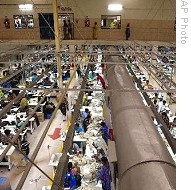-
(单词翻译:双击或拖选)
 |
| Bangladeshi workers in textile factory on outskirts3 of Dhaka (2005 file photo) |
Manufacturing ready-made garments, an industry largely extinct in the developed world, is the economic engine of Bangladesh, providing about 80 percent of its hard currency. In the past three decades the made-in-Bangladesh tag has become ubiquitous in closets from London to Los Angeles.
Focusing on the lower and middle end - with some famous designer names also in the rack - has meant Bangladesh has withstood changing global fashions.
But now the worry is more about credit lines than hemlines.
At the factories of the Babylon Group, where nearly 10,000 workers churn out everything from T-shirts to formal wear, there is growing concern, however, about the ramifications4 of worried Western consumers foregoing non-essential purchases in 2009.
But company director Abidur Rahman is optimistic his racks of outbound garments can stay full even if his main competitors in China, Vietnam and the African continent see a thinning of the ranks.
"We don't expect, all of a sudden, the business, will go away from Bangladesh because of the long experience and very good skill. We are professional if you compare [us] with others," he said.
Some Bangladeshi manufacturers are reporting an increase in orders as factories shut down elsewhere, such as China, unable to compete with Bangladesh's combination of cheap labor and reliability5.
The motivation to stay competitive is evident among those operating the rows and rows of sewing machines on Babylon's factory floor in Dhaka.
Zahanara Begum, who has been at this for 15 years, makes about $50 a month. She says 2008 was good but she is apprehensive6 about the new year.
Begum predicts confidently that if she and her colleagues can maintain their quality of work and productivity they can stay competitive in the tougher global economic environment.
At the head office of the Bangladesh Garment Manufacturers and Exporters Association, there is apprehension7 the industry could be undercut by a domestic, not foreign, factor.
Association vice8 president Shahidul Islam implores9 the government to cut interest rates as, at present, banks are charging borrowers around 15 percent for commercial loans.
"This recession the industry cannot face. They should take their decision on this. Otherwise industry cannot face these things. And if industry cannot face this decision [of having an interest rate cut] our whole Bangladeshi economy will be in a problem," he said.
At stake are the livelihoods10 of 2.5 million workers and more than $10 billion of annual income for their bosses.
 收听单词发音
收听单词发音
1
yarn

|
|
| n.纱,纱线,纺线;奇闻漫谈,旅行轶事 | |
参考例句: |
|
|
|
2
labor

|
|
| n.劳动,努力,工作,劳工;分娩;vi.劳动,努力,苦干;vt.详细分析;麻烦 | |
参考例句: |
|
|
|
3
outskirts

|
|
| n.郊外,郊区 | |
参考例句: |
|
|
|
4
ramifications

|
|
| n.结果,后果( ramification的名词复数 ) | |
参考例句: |
|
|
|
5
reliability

|
|
| n.可靠性,确实性 | |
参考例句: |
|
|
|
6
apprehensive

|
|
| adj.担心的,恐惧的,善于领会的 | |
参考例句: |
|
|
|
7
apprehension

|
|
| n.理解,领悟;逮捕,拘捕;忧虑 | |
参考例句: |
|
|
|
8
vice

|
|
| n.坏事;恶习;[pl.]台钳,老虎钳;adj.副的 | |
参考例句: |
|
|
|
9
implores

|
|
| 恳求或乞求(某人)( implore的第三人称单数 ) | |
参考例句: |
|
|
|
10
livelihoods

|
|
| 生计,谋生之道( livelihood的名词复数 ) | |
参考例句: |
|
|
|















